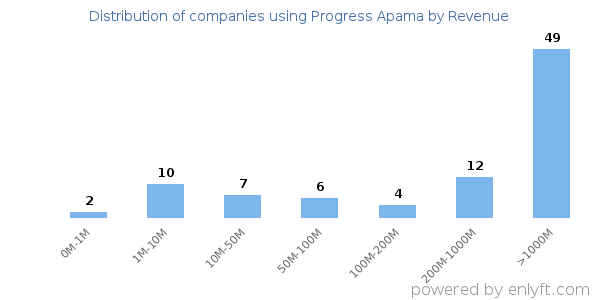Companies using Progress Apama
We have data on 71 companies that use Progress Apama. The companies using Progress Apama are most often found in United States and in the Financial Services industry. Progress Apama is most often used by companies with >10000 employees and >1000M dollars in revenue. Our data for Progress Apama usage goes back as far as 8 years and 9 months.
If you’re interested in the companies that use Progress Apama, you may want to check out Microsoft power BI and MATLAB as well.
Who uses Progress Apama?
| Company | Cognizant Technology Solutions Corp |
| Website | cognizant.com |
| Country | United States |
| Revenue | >1000M |
| Company Size | >10000 |
| Company | HP Development Company, L.P. |
| Website | hp.com |
| Country | United States |
| Revenue | >1000M |
| Company Size | >10000 |
| Company | Wipro Ltd |
| Website | wipro.com |
| Country | India |
| Revenue | >1000M |
| Company Size | >10000 |
| Company | Ernst & Young Global Limited |
| Website | ey.com |
| Country | United States |
| Revenue | >1000M |
| Company Size | >10000 |
| Company | Tata Consultancy Services Ltd |
| Website | tcs.com |
| Country | India |
| Revenue | >1000M |
| Company Size | >10000 |
| Company | Website | Country | Revenue | Company Size |
|---|---|---|---|---|
| Cognizant Technology Solutions Corp | cognizant.com | United States | >1000M | >10000 |
| HP Development Company, L.P. | hp.com | United States | >1000M | >10000 |
| Wipro Ltd | wipro.com | India | >1000M | >10000 |
| Ernst & Young Global Limited | ey.com | United States | >1000M | >10000 |
| Tata Consultancy Services Ltd | tcs.com | India | >1000M | >10000 |
Target Progress Apama customers to accomplish your sales and marketing goals.
Progress Apama Market Share and Competitors in Analytics
We use the best indexing techniques combined with advanced data science to monitor the market share of over 15,000 technology products, including Analytics. By scanning billions of public documents, we are able to collect deep insights on every company, with over 100 data fields per company at an average. In the Analytics category, Progress Apama has a market share of about 0.1%. Other major and competing products in this category include:
Analytics
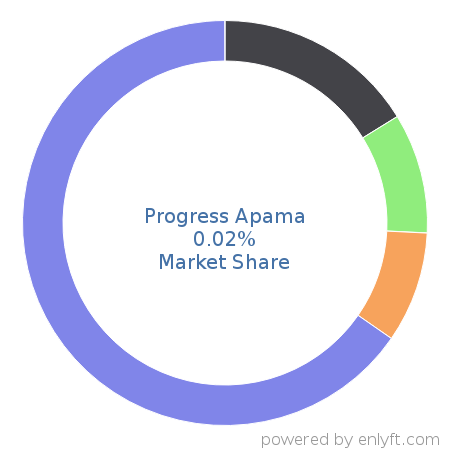

What is Progress Apama?
Apama Streaming Analytics is a platform for streaming analytics and intelligent automated action on fast-moving big data. Combining event processing, messaging, in-memory data management and visualization, this platform is the most complete solution to turn relentless data streamslike those produced by the Internet of Things (IoT) into meaningful real-time metrics.
Top Industries that use Progress Apama
Looking at Progress Apama customers by industry, we find that Financial Services (27%), Banking (16%), Computer Software (13%) and Information Technology and Services (11%) are the largest segments.
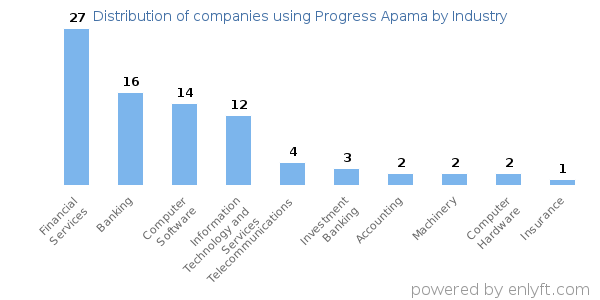
Top Countries that use Progress Apama
44% of Progress Apama customers are in United States, 6% are in United Kingdom, 6% are in India and 6% are in Canada.
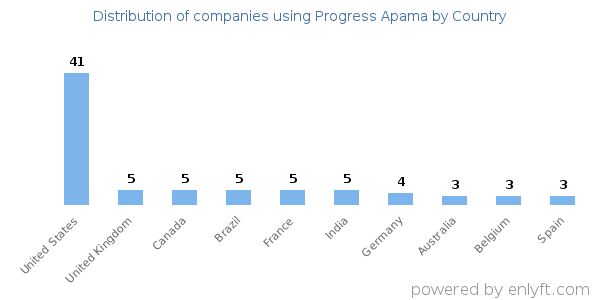
Distribution of companies that use Progress Apama based on company size (Employees)
Of all the customers that are using Progress Apama, a majority (64%) are large (>1000 employees), 13% are small (<50 employees) and 13% are medium-sized.
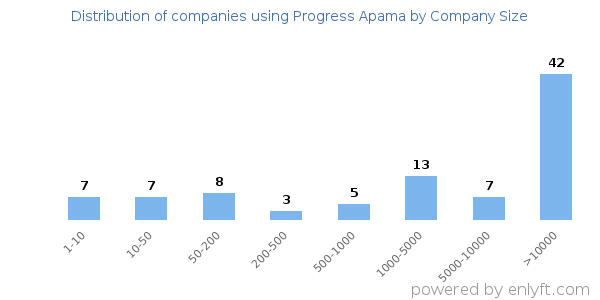
Distribution of companies that use Progress Apama based on company size (Revenue)
Of all the customers that are using Progress Apama, a majority (66%) are large (>$1000M), 10% are small (<$50M) and 6% are medium-sized.
